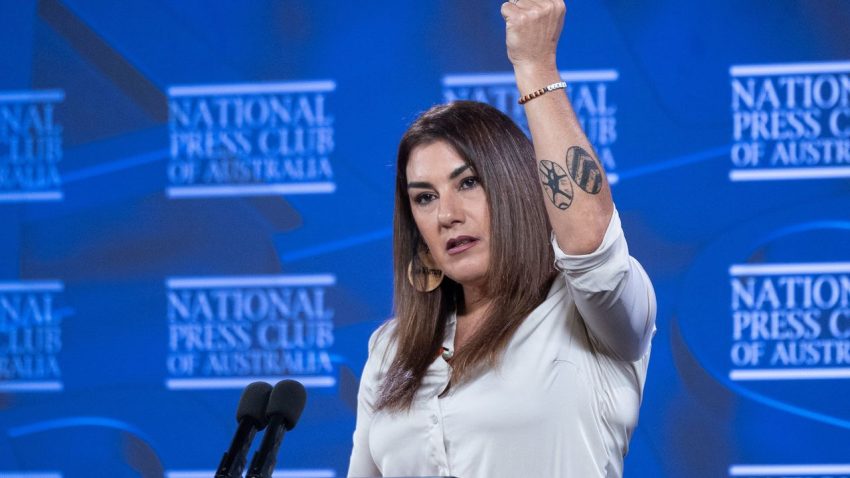Three main Voice campaigns have coalesced as we approach the Referendum.
There’s the ‘Yes’ campaign, supported by the Federal Government and all State and Territory governments, all major Australian faith groups, many sporting codes and a few large corporates.
There’s the ‘Conservative No’, also known as the ‘Racist No’, supported by the Federal Opposition and funded partially by far-right US Christian groups.
Then there’s the ‘Progressive No’, the position of the Black Sovereign movement, born with the Tent Embassy on the lawns of Parliament House in Canberra in 1972. This movement maintains that sovereignty, the authority for our First Nations peoples to self-govern, has never been ceded.
Independent Senator and Djab Wurrung, Gunnai and Gunditjmara woman Lidia Thorpe represents the Black Sovereign movement in Parliament. She spoke at the National Press Club in August, saying that First Nations peoples are still living under colonialism and the damage it has done since 1788.
‘The frontier wars have never ended,’ she said. ‘Same wars, different weapons.’ She cited deaths in custody and child removal, both the subjects of Royal Commissions with their recommendations largely ignored.
‘This country, your system of government, has been built on lies,’ she said. ‘And the Referendum for a Voice to Parliament is a continuation of these lies… It’s false hope because it’s tricking people into genuinely believing that a powerless advisory body is going to protect our Country and sacred sites, save our lives, keep our babies at home.’
But rather than advising a ‘No’ vote, Thorpe is calling for the Referendum to be cancelled.
Instead she wants implementation of the recommendations of the Royal Commission into Aboriginal Deaths in Custody, the ‘Bringing Them Home’ Report, and the United Nations Declaration on the Rights of Indigenous People.
She has a point. The fact that the government will ‘make laws with respect to [the Voice’s] composition, functions, powers and procedures’ makes it more palatable to some, but gives credence to Thorpe’s claim that it will be powerless.
The ‘Yes’ campaign and the ‘Progressive No’ campaign are ultimately after the same outcome: the justice that the Statement from the Heart is asking for. But one is willing to work with government and the colonial structures that we undeniably have, while the other believes that the Voice will cement the representational body into those colonial structures and will change nothing.
History is littered with broken promises. But an advantage of the Voice over previous advisory bodies, says Daniel James, contributor to The Saturday Paper, is ‘the representational structure … that has regional representation feeding up into that central Voice that will speak directly to power. Because history has shown that the further away decision makers are from communities, the worse the outcomes.’ James, a Yorta Yorta man, will be voting ‘Yes’. If the polls are to be believed, so will the majority of First Nations peoples.
This piece was first published in The Triangle community newspaper in September 2023.

Once again, well summarised, Jen. I will be voting Yes. Despite any shortcomings, my fear is that if this referendum doesn’t get up, absolutely nothing will change for indigenous communities, and a once-in-a-generation opportunity will be lost.
Libby, exactly.
Thanks for your comments Jen. Your comments have only added to my thoughts. I will be voting Yes
You, me and hopefully enough others in enough states, Bruce.
I will be voting No. I am not a racist. I have nothing to do with ‘far-right US Christian groups’. I am an adult Australian, able to think for myself. I object most strongly to being put into a box labelled ‘Conservative No/Racist No’. Will you also be posting Jacinta Nampijinpa Price’s address to the National Press Club?
Thanks Bernadette. Maybe you are in the ‘Progressive No’ camp.
I have been writing these articles for the monthly Triangle newspaper so the one that came out yesterday in the October edition was my last one (unless I decide to do a ‘wrap’). I will post it here on my blog in a week or so. I decided to end the series by going back to the Uluru Statement. I challenge any thinking Australian to read it and still vote No. Have you read it?